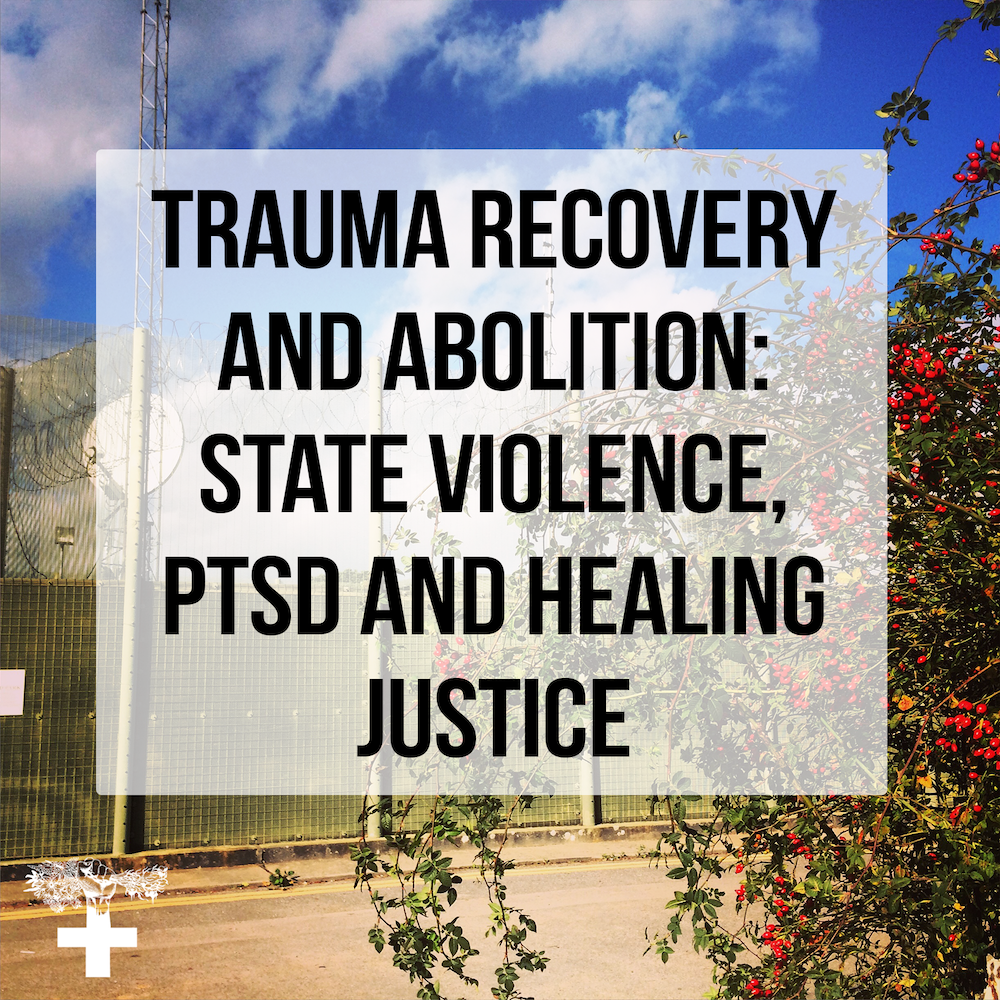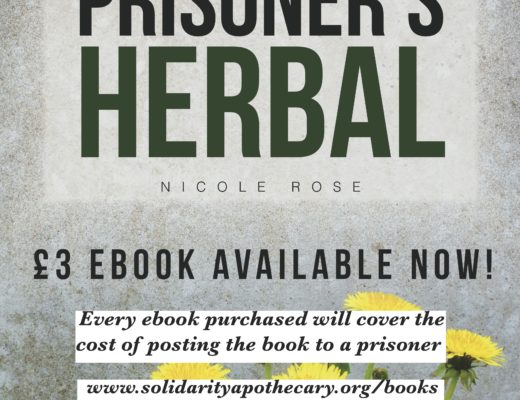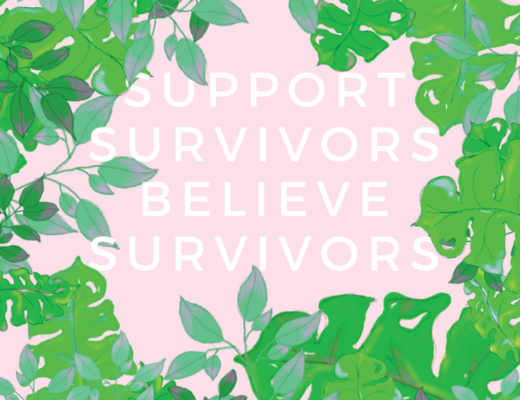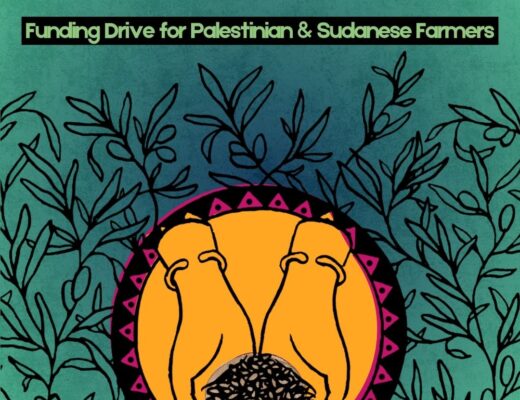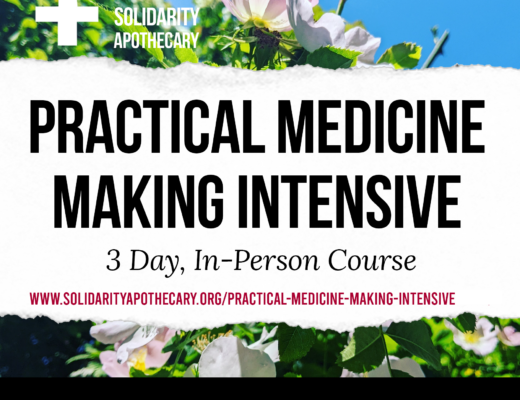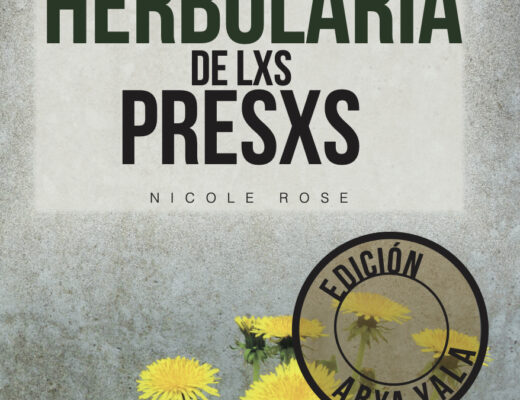My article ‘Trauma Recovery and Abolition: State violence, PTSD and Healing Justice’ has now been translated into Spanish by Heather Anne (see below). The blog was originally published in 2019, here. I’ve also copied it here:
This February, actually only a day or so after writing my last blog about herbs for anger and rage, the scales completely tipped on my mental health and the overwhelm I experienced triggered a bad mental health episode whereby I was debilitated by post traumatic stress. For the first time in 15 years, I had to take a step back from prisoner-support, leave my projects and be signed off sick from work as literally any mention of the word ‘prison’ spiralled me out of control into aggressive states of rage and anxiety.
I wrote this piece below in the midst of the breakdown as I battled with the grief of not knowing WTF to do when this movement has been my life. Thankfully, I’m now doing a lot better after two months of rest and some skilled support and mutual aid from two therapists and a small group of amazing friends. Yet still unable to organise, I ask the questions what will it take to heal? How does recovery relate to abolition? How do we support survivors of state violence recover and resist?
The original writing:
Shaped from the age of 16 when my first partner went to prison, I feel like prison has moulded my body. Because I was so young (21) when I went in, that somehow now prison is a part of me. That I’m trapped forever. That I will never be able to erase that experience so it will haunt me for the rest of my life. Which explains why I have been hell-bent on abolition because I am somehow trying to destroy my own memories, abolish my own past. The same way that we avenge people’s deaths like somehow the vengeance will heal our loss, our grief.
I have been hooked on revenge because I thought it would heal me, I thought it would stop the pain. And yes, my organising has been generative of huge amounts of solidarity, visible resistance and genuine outcomes for people’s survival and strength… but it only kept my demons at bay for as long as I had the strength to fight them. The strength to repress. The strength to silence the ghosts and the memories with workaholism. The ability to maintain a state of anger and rage, which propelled me for years and years.
But eventually, we become fatigued of war, fatigued of war with the state and its overwhelming violence. We become fatigued of war with ourselves, of the exhausting endurance we subject ourselves to. The performance of strength and the glamour that we are doing okay, it was a long time ago, I’ve had therapy etc.
And we dwell on those we have left there, still behind enemy lines and the responsibility weighs heavy on our chests. And the weight crushes any other dreams or desires as we cannot move on because our hearts are looking back for those we love who remain imprisoned. And every phone call from a friend inside takes me back to that place. The smell of the tobacco on the phone piece, the barks of screws, the scared skin and the rooms with no air and no keys. And every visit, I re-enter the prison and go through the same rituals of repression, when all I want to do is rip the throat out of the officer searching me, while I am forced to wait and obey in order to keep seeing those that I love.
And every re-experiencing of that place numbs my heart because to feel it all would shatter it. For years, I would lie next to a lover, unable to feel their lips on my skin, so beyond my body that unless they wielded some force upon me, I could not feel anything at all. Because to feel love is to feel pain, to feel loss, to feel captivity, to feel enclosing walls, to feel deeply unsafe. If you are lucky enough to know a sense of safety before prison, then you can at least grieve the feeling because stepping inside those walls evaporates whatever you thought you knew about safety in your body. Hyper-vigilance becomes you. It holds your skeleton up.
The only way to not go mad is to leave your body behind. Yet this creates its own form of insanity, where you can no longer exist in a world that requires you to ‘know your body’. So separate from its flesh, you can no longer feel its hunger, its tiredness, its cues that its asking you to slow down, to rest. And so on release, you don’t need officers to control you or target you, you are now completely capable of destroying yourself, of wrecking your body with drugs and alcohol, or through an addiction to war and revenge.
‘Destroy what destroys you’. The abolition of prisons becomes a fight to abolish your own trauma, yet you are like a fox caught in a trap. The more you move the more flesh you rip and the more you bleed. The more I engaged in abolition, the more that my life became dominated by prison, the more I gave power to those memories. Verbalising the pain brought it all to life again. Like I had conjured the ghosts once more.
“The abolition of prisons becomes a fight to abolish your own trauma.”
So now I am trapped between struggles to erase and struggles to embrace. The desire to walk away from it all is huge as if the only freedom comes with a lock and a key to that part of my psyche. Yet the abandonment of my friends feels too unbearable to accept. Knowing the pain of abandonment in prison, doing that to them seems beyond comprehension.
And so now the task is to find a way beyond abandonment and repression that will enable me to put my ghosts to rest, be there for my friends and be part of a movement to abolish prisons. Is this the healing justice I have always sought? What could that look like in our movements?
We want ex-prisoners and prisoners to lead this struggle yet without recognition of trauma recovery, we may as well be leading them to the slaughter. So is my next state of abolition less about war and more about healing? What collective resources can we leverage to support our loved ones in recovery from prison? For me, it’s plant medicines, yet there are many tools in the toolbox and the time is now to support each other to heal our wounds. To find healing in ways that do not involve re-imprisonment or yet even more state violence (such as being sectioned to a psychiatric hospital). To find healing in ways that build mutual aid, reconnection and relationship. To recognise that abolition is as much about trauma recovery as it is about resistance. That reclaiming life from trauma is resistance. That recovery must be a politicised act and a collective endeavour.
“To recognise that abolition is as much about trauma recovery as it is about resistance.”
Prison dehumanises you so brutally. It becomes you against the world and so loneliness is the default, not only in surviving your sentence but in navigating recovery. I do not want to be alone anymore in this. I don’t want to drop out of a movement in order to reclaim some sanity from this PTSD. I want to feel loved and supported and held by comrades. Prison makes you disappear, it destroys your relationships. I don’t want to lose all the family and friendships I have built through engaging in abolition organising. I don’t want to disappear because I don’t have the capacity to organise right now. So I return to the question, what will it take to heal? And where do we start?
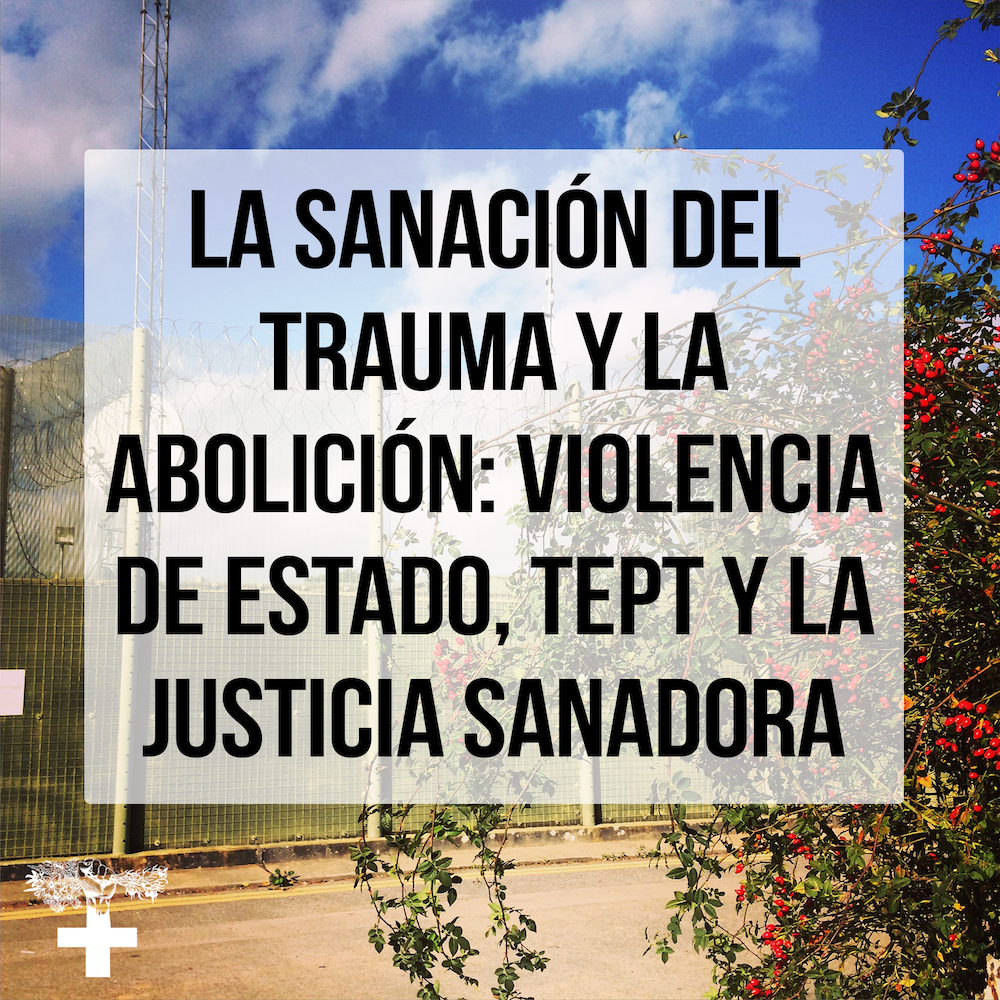
“La Sanación del Trauma y la Abolición: Violencia de Estado, TEPT y la Justicia Sanadora”
Publicado el 6 de mayo de 2019 – https://solidarityapothecary.org/trauma-recovery-and…/
Original en inglés: Nicole Rose (Solidarity Apothecary)
Traducción al español: Heather Anne
Este mes de febrero, en realidad sólo un día más o menos después de escribir mi último blog sobre hierbas para la ira y la rabia, la balanza se inclinó por completo en cuanto a mi salud mental. El agobio que sentí detonó un mal episodio de salud mental en lo cual me debilitó el estrés postraumático. Por primera vez en 15 años, tuve que tomar una pausa en mi trabajo de apoyo para presxs, abandonar mis proyectos y dejar el trabajo por causa de enfermedad, ya que literalmente cualquier mención de la palabra “prisión” me descontrolaba y me llevaba a estados agresivos de rabia y ansiedad.
Escribí este artículo en medio de la crisis, mientras luchaba contra el dolor de no saber qué hacer ya que este movimiento ha sido mi vida. Afortunadamente, ahora estoy mucho mejor después de dos meses de descanso y algo de acompañamiento cualificado y apoyo mutuo de dos terapeutas y un pequeño grupo de amigxs increíbles. Aun así, incapaz de organizarme, me pregunto: ¿Qué hace falta para sanarse? ¿Cómo se relaciona la recuperación con la abolición? ¿Cómo podemos ayudar a lxs sobrevivientes de la violencia de Estado a recuperarse y resistir?
El artículo original: Desde los 16 años cuando mi primera pareja ingresó en prisión, siento que la cárcel ha moldeado mi cuerpo. Como era tan joven (tenía 21 años) cuando me tocó a mí, de alguna manera ahora la cárcel forma parte de mí. Siento que estoy atrapada para siempre. Que nunca podré borrar esa experiencia, así que me perseguirá el resto de mi vida. La razón por la cual me he empeñado en la abolición es porque de algún modo intento destruir mis propios recuerdos, abolir mi propio pasado. Es como el mismo modo que vengamos la muerte de las personas, como si de algún modo la venganza fuera a sanar nuestra pérdida, nuestro dolor.
Me he enganchado a la venganza porque creía que me sanaría, creía que detendría el dolor. Y sí, mi trabajo organizativo ha generado enormes cantidades de solidaridad, resistencia visible y resultados reales para la sobrevivencia y la fuerza de las personas… pero sólo mantuvo a raya mis demonios mientras tuve la fuerza para luchar contra ellos. La fuerza para reprimir. La fuerza para acallar los fantasmas y los recuerdos con adicción al trabajo. La capacidad de mantener un estado de ira y rabia, que me impulsó durante años y años.
Pero, con el tiempo, nos cansamos de la guerra, nos cansamos de la guerra contra el Estado y su violencia abrumadora. Nos fatigamos de la guerra con nosotrxs mismos, de la agotadora resistencia a la que nos sometemos. La actuación de fuerza y el glamour de que estamos bien, fue hace mucho tiempo, he ido a terapia, etc.
Y nos quedamos pensando en los que hemos dejado allí, todavía tras las líneas enemigas, y la responsabilidad pesa sobre nuestro pecho. Y el peso aplasta cualquier otro sueño o deseo, ya que no podemos seguir adelante porque nuestros corazones miran hacia atrás en busca de aquellxs a quienes amamos y que siguen presxs. Y cada llamada telefónica de unx amigx presx me regresa a ese lugar. El olor del tabaco en la pieza telefónica, los ladridos de los tornillos, la piel asustada y las habitaciones sin aire y sin llaves. Y en cada visita, vuelvo a entrar en la prisión y paso por los mismos rituales de represión, cuando lo único que quiero es arrancarle la garganta al funcionarix que me registra, mientras me obligan a esperar y obedecer para poder seguir viendo a lxs que amo.
Y cada vez que vuelvo a sentir la presencia de ese lugar, mi corazón se entumece porque si lo sintiera todo, lo destrozaría. Durante años, me tumbaba junto a unx amante, incapaz de sentir sus labios en mi piel, tan afuera de mi cuerpo que, a menos que ejercieran alguna fuerza sobre mí, no podía sentir nada en absoluto. Porque sentir amor es sentir dolor, sentir pérdida, sentir cautiverio, sentir muros que encierran, sentirse profundamente insegurx. Si tienes la suerte de conocer una sensación de seguridad antes de la prisión, entonces al menos puedes lamentar la sensación porque al entrar en esos muros se evapora todo lo que creías conocer sobre la seguridad en tu cuerpo. La hipervigilancia se convierte en ti. Sostiene tu esqueleto.
La única forma de no volverte locx es abandonar tu cuerpo. Sin embargo, eso crea su propia forma de locura en la que ya no puedes existir en un mundo que requiere que “conozcas tu cuerpo”. Separadx de su carne, ya no puedes sentir su hambre, su cansancio, sus señales de que te pide que bajes el ritmo, que descanses. Y así, en libertad, ya no necesitas a lxs agentes para que te controlen o te apunten, ahora eres completamente capaz de destruirte a ti mismx, de destrozar tu cuerpo con drogas y alcohol, o mediante una adicción a la guerra y la venganza.
‘Destruye lo que te destruye’. La abolición de las prisiones se convierte en una lucha por abolir tu propio trauma, pero eres como un zorro atrapado en una trampa. Cuanto más te mueves, más te desgarras y más sangras. Cuanto más me involucraba en la abolición, más dominaba mi vida la prisión, más poder daba a esos recuerdos. Al verbalizar el dolor, todo volvía a la vida. Como si hubiera conjurado de nuevo a los fantasmas.
Así que ahora estoy atrapada entre la lucha por borrar y la lucha por abrazar. El deseo de alejarme de todo es enorme, como si la única libertad viniera con un candado y una llave para esa parte de mi psique. Sin embargo, el abandono de mis amigxs me parece demasiado insoportable para aceptarlo. Conociendo el dolor del abandono en prisión, hacerles eso me parece incomprensible.
Así que ahora la tarea es encontrar un camino más allá del abandono y la represión que me permita poner mis fantasmas a descansar, estar presente para mis amigxs y formar parte de un movimiento para abolir las prisiones. ¿Es ésta la justicia sanadora que siempre he buscado? ¿Qué aspecto podría tener en nuestros movimientos?
Queremos que lxs ex-presxs y lxs presxs lideren esta lucha, pero sin el reconocimiento de la necesidad de recuperarse del trauma, puede que lxs estemos llevando al matadero. Entonces, ¿mi próximo estado de abolición tiene menos que ver con la guerra y más con la sanación? ¿Qué recursos colectivos podemos aprovechar para ayudar a nuestrxs seres queridxs a recuperarse de la cárcel? Para mí, son las plantas medicinales, aunque hay muchas opciones en la caja de herramientas y ahora es el momento de apoyarnos mutuamente para sanar nuestras heridas, para encontrar formas de sanarnos que no impliquen un nuevo encarcelamiento o incluso más violencia estatal (como el internamiento en un hospital psiquiátrico), para encontrar las formas de sanarnos que construyan el apoyo mutuo, la reconexión y la relación. Reconocer que la abolición tiene que ver tanto con la recuperación del trauma como con la resistencia, que rescatar la vida de las garras del trauma es resistencia, y que la recuperación debe ser un acto politizado y un esfuerzo colectivo.
La cárcel te deshumaniza brutalmente. Se convierte en tú contra el mundo y, por tanto, la soledad es la norma, no sólo para sobrevivir a la condena, sino también para navegar por la recuperación. No quiero seguir sola en esto. No quiero abandonar un movimiento para recuperar algo de cordura de este TEPT. Quiero sentirme querida, apoyada y sostenida por compañerxs. La cárcel te hace desaparecer, destruye tus relaciones. No quiero perder toda la familia y las amistades que he forjado participando en la organización abolicionista. No quiero desaparecer porque ahora mismo no tengo capacidad para organizarme. Así que vuelvo a la pregunta: ¿qué hace falta para sanar? ¿Y por dónde empezamos?

